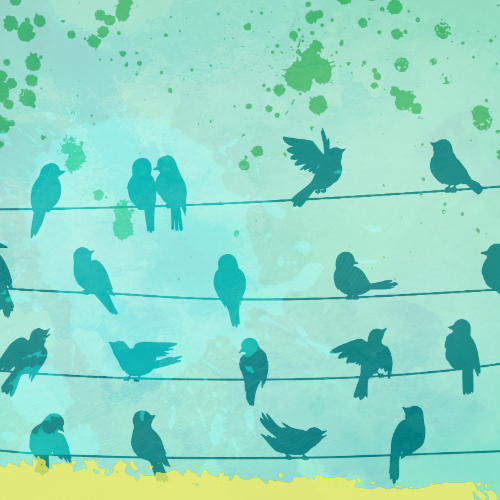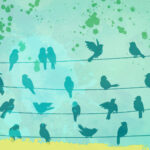What the birds are saying
Flash Fiction
by Fiona Mossman
NB. This piece is best viewed in the desktop version.
I.
My laboratory is on the basement level with soundproofing and no windows, so it’s only once I leave work that I can see and hear the birds without mediation. It’s funny, when you spend all day running analysis on birdsong, how unfamiliar listening to actual birds can be. Suddenly it’s not just Sample 34B: Erithacus rubecula, it’s that robin, there, in the hedge singing its little heart out. The movement always catches me off-guard, too: such abruptness, nearly invisible to the eye, just a hop and a whirr of the wings and they’re elsewhere.
My smile fades as I pass the hedgerow and continue my walk back to my rented flat at the edge of town. It’s not that simple, for us. I’ve got a million and one things that I should be doing, and I can’t find the time to be where I need to be. It’s hard enough just to get myself to and from the laboratory, to take care of my own food and sleep, with that constant threat hanging over me. If I don’t publish soon they might take away my funding. My position at the university. Never mind that I’ve made so many breakthroughs; never mind that there is so much more I need to record. Never mind that there are whole lexicons I’ve yet to unlock. Never mind that it’s impossible to tell people about what the birds are saying because everybody seems to think that humans are the only ones speaking. Never mind that without this work I may not be able to stay in this country. Never mind that my mother is ill.
How ill? I asked when the news came, my voice disappearing into the phone that held our words together across the oceans. She’s not going to last long, my aunt replied. But we’re taking care of her. No need for you to leave, no need for you to return. We know you’re busy.
I used to dream in the language of my homeland but I have been here so long, in this sea-locked country under skies of cloud, that it is fading.
My colleague who records whalesong told me that once, the songs of whales would have been audible in all the oceans of the whole planet. But now those songs are depleted, one whale’s call barely reaching the next, whole areas of the ocean silent where once they were blithely, heartbreakingly replete. I wonder how the whales feel, in their quieter oceans. Whether they remember how it used to be.
Never mind that I do not know how to say what I need to say. The language of birds: a study. In this paper I forget how to talk the language of the scholar. All my words are winging their way to the wrong listeners, in the wrong languages. My dreams do not have words.
II.
how to speakwhydo yourwhy have you forgotten
how to speak
how to speak why
how to speakwhydo do your songs
how to speakwhydo yourhow to speno longer carry
how to speakwhydo yourhow to speakwhydo yoany meaning
why
how towis there no song
how to speakwhydo yorfrom the sea
how to speakwhydo yourhow to speakany more
where are
how to speakwrthe singers of the sea
how to speakwhydo yourhow to speakw to our family
why do they
how to sno longer sing
how to speakwhydoacross the oceans
how to speakwhydo yourhow to why is the land
how to speakwhydo yourhow to speakw to silent too
what happened to your language
how to speakwhyyou, who are our family too
how to speakwhydo yourhow to speakw to did you lose it
how to speakwhydo yourhow to speakw to speakw to while you carved
meaningless symbols into stones
how to speakwhyhow to spand dead rushes
how to speakwhydo yourhow to speakw to and dead trees
pulped rags
how to spbright screens in dark rooms
how to speakwhyhow to spno sound, no sense
how to speakwhydo yourhow to speakw to why did you turn
away from us
how to speakwhen did you forget
how to speakwhydo yourhow tohow to talk
how to speakwhydo yourhow to speakw to oh, wingless ones
why will you not listen
how to speakwhydo why are our songs
how to speakwhydo yourhow to speakw to disappearing
will there ever be
how to speaany language
how to speakwhydo youany meaning
how to speakwhydo yourhow to speany song
how to speakwhydo yourhow to speakw to when we’re gone?
III.
At home I turn my laptop back on, set an analysis programme running while I make myself dinner. I drift between the pot on the hob and the laptop on the counter, opening the document that’s meant to be my job-saving publication. I eat mechanically, eyes on the screen.
The last time that I heard my mother’s voice was three months ago, when she called me to wish me a happy birthday. Are you celebrating? She had asked, her voice right there in my ear. It was slightly husky. I wonder now if that was a sign, if I should have known that she was getting ill. Or was her voice always husky, and I had somehow forgotten?
I’m just having a quiet one, I told her. When I put the phone down I wandered the flat for hours, not sure where the restlessness came from. I’d intended to watch a film, one of my favourites. But my feet kept on getting me up, walking me through to the kitchen, to the hallway. There was a tingling, an itch, where my shoulders met my back.
I finish the last of my food and take the plate through to the kitchen to leave it in the sink. I force myself to turn back to the laptop. To analyse the recordings, to trace the lines of connection, the repetitions and the variations and the changing notes. To classify and categorise, to theorise. To remain open to the possibility of being wrong. To listen.
I open a new tab, and look up the flights. My fingers hover over the keys. I could go to the airport tomorrow, and be at my aunt’s by the evening. Or I could fly the day after, or at the weekend.
I try to remember what the words are in my mother-tongue for I came as soon as I could. For I’m sorry. For Why don’t we speak the way we used to.
That night, I dream I am a bird. From the inside, hedges are cosy, exciting places of intersecting branches and safety. I hop and flutter as fast as thought, small brown bird that I am, wings a blur of quickstop motion.
I open my beak, and let the songs pour forth.

About the Author
Fiona Mossman (she/her) is a writer from the Scottish highlands. She adores short stories and her writing is often inspired by fables and folktales. She has studied literature and book history and works as a librarian in Edinburgh. Some of her stories can be found in Crow & Cross Keys, ‘We Are All Thieves of Somebody’s Future’ from Air & Nothingness Press, ‘The Utopia of Us’ from Luna Press, and elsewhere. Her writing has been nominated for the Best Small Fictions 2023 and Best Microfiction 2025.


